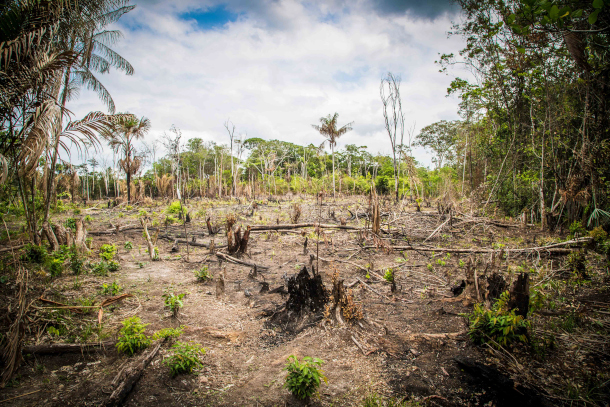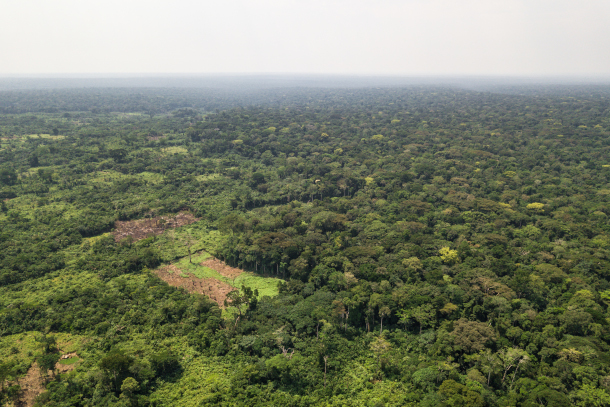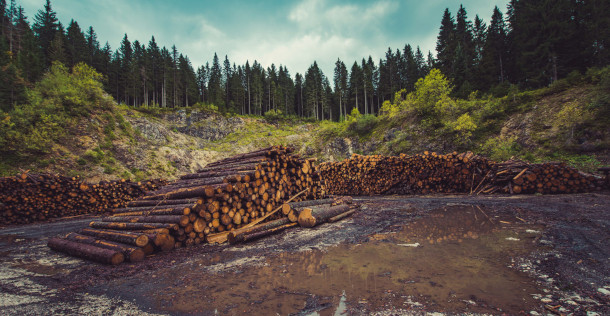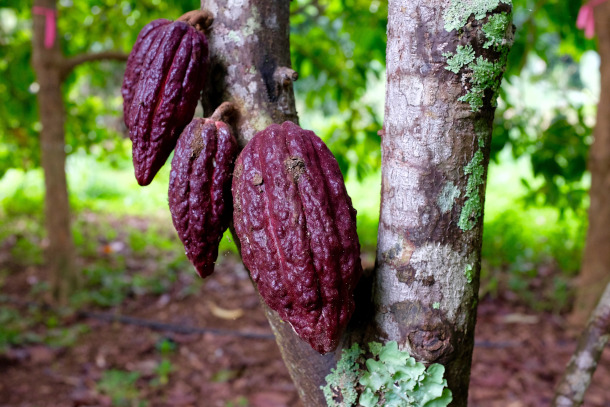EU Bans Deforestation Products
Air Date: Week of June 23, 2023

Deforestation in Brazil from palm oil development. (Photo: Miguel Pinheiro, CIFOR, Flickr, CC BY-NC-ND 2.0)
The European Union has enacted legislation aimed at reducing global deforestation with a ban on the sale of products made from cattle, cocoa, coffee, palm oil, soya, and wood, produced on land deforested after 2020. Anke Schulmeister, the Senior Forest Policy Officer for the World Wildlife Fund joined Living on Earth’s Jenni Doering to explain.
Transcript
O’NEILL: From PRX and the Jennifer and Ted Stanley Studios at the University of Massachusetts Boston this is Living on Earth. I’m Aynsley O’Neill.
DOERING: And I’m Jenni Doering.
The European Union is speaking for the trees, at least with a new policy. Its 27 member countries recently adopted rules aimed at reducing their contribution to global deforestation. According to the World Wildlife Fund the EU is one of the world’s largest importers of goods from tropical deforestation and associated emissions, second only to China. So the EU Deforestation-Free Regulation will block certain products from entering the European market if they have been produced on land deforested after December 31st, 2020. Members of the EU will need to inspect imported products and turn away non-compliant shipments, and they’ll also check the compliance of goods produced within the EU itself. Anke Schulmeister is a Senior Forest Policy Officer for the World Wildlife Fund and joins us from Brussels to explain the new anti-deforestation law. Welcome back to Living on Earth Anke!
SCHULMEISTER: Yeah, thank you so much for inviting me again.
DOERING: So, can you give me an example of a product sold in the EU that might be affected here.
SCHULMEISTER: So, it could be the steak for dinner. It could be the chocolate for either in your hot milk or with your hot coffee, it could actually be even the coffee that you are taken for breakfast, or for lunch.
DOERING: So which countries are the producers of these kinds of products like palm oil, beef, soy, cocoa, coffee, and wood that could be affected by this EU deforestation law?
SCHULMEISTER: Yeah, I think there could be quite a number of countries are affected. So for example, the biggest producers of palm oil worldwide are Indonesia and Malaysia. But we also have big slide producers like Brazil, Argentina, or also the United States who do that. And we also produce even some soy here in the EU. For Cokoa we have countries in Latin America, but also in Africa. Timber is US also a lot, it is also in China and in the EU itself. I mean, the products come from a lot of different places all over the world.
DOERING: So how will companies be able to actually prove that their products weren't involved in leading to deforestation?
SCHULMEISTER: So the companies would need to use a system that is called due diligence. What due diligence means is that companies need to assess the risk on whether a product that they would like to place on the market in the EU can be linked to deforestation or not. If their analysis comes to the conclusion, that there might be a risk, they would need to take measures to mitigate this risk and if this risk cannot be mitigated, then they will not be allowed to place this product on the market. What is important to understand this that this law applies before a product is placed on the market. If for example, there is a big soy shipment coming to the EU, this will be checked by the customs authorities, you know, they will look into the information and they will decide whether this ship can then be unloaded or not.

Deforestation near Yangambi in the Democratic Republic of Congo. According to the United Nations Food and Agriculture Organization around 10 million hectares of forest are cut every year contributing to biodiversity loss and speeding up climate change. (Photo: Axel Fassio, CIFOR, Flickr, CC-BY-NC-ND-2.0)
DOERING: Also, a company might be able to say that a product came from this particular plot of land. But is there any other way of really identifying and verifying that that is in fact the case?
SCHULMEISTER: Yeah, so to determine these plots of land, companies will need to provide geolocation data. So they will actually provide the longitude and latitude data on where these products were produced. What that means is that you could imagine, it's like being a big map of all the plots of land that you are sourcing your products from, which can then be checked via satellite imagery. So they see has the land being converted after a certain date. So that makes the verification easier.
DOERING: We hear a lot about the deforestation happening in the Amazon, or in Indonesia, or increasingly these days in the Congo, which is another huge tropical rainforest. How might these regulations help ease deforestation pressures in those places?
SCHULMEISTER: Yeah, so this legislation also has an article that really clearly talks about cooperation with producer countries. So countries that are producing these kind of products, they set up a specific so called strategic framework, to support those countries to address the underlying causes for this deforestation and also to help small holders, so small farmers and others to comply with the demands of the legislation. But we also need to keep in mind, this legislation is not a one size fits all solution, it needs a lot of other complementary measures to really address the global problem of deforestation.

According to the Union of Concerned Scientists wood production causes 380,000 hectares of deforestation annually. (Photo: Codie, Flickr, Public Domain)
DOERING: Anke, can you give me examples of products that could be produced in a forest on forest land without degrading the forest without requiring the forest to be cut down? I mean, I'm thinking of shade grown coffee, you know, we hear about that as a way to both preserve the forest and a way for people locally to make some money off of the forest. Are there any other examples like that, that would still comply with these rules?
SCHULMEISTER: I mean, when we look at the degradation perspective the definition that is in the new law, only covering part of what degradation is, so degradation could be you still have the forest standing, but you have cut so many trees that it has lost some of its functions. But that does not mean that you cannot cut certain timber out of a forest. If it keeps all the functions and if the forest is still resilient, again, this could very well be placed on the market. So for example, the timber that you would like to have for your kitchen table. And I think maybe another element which for us at WWF is very important, but which unfortunately we did not get in this legislation, is this law only applies currently to forests but it does not apply to other ecosystems, but the conversions or the destruction of other ecosystems is also very important and at the moment, very much going on. So as we speak the Cerrado, which is a savanna, so the mix of grass and woodland in Brazil has the highest rate over 80% more that was converted of that area than it has been in the May last year and that is quite a number. And that means that even if you protect the forests, we might have an effect a negative effect that it moves into other areas, and that should be stopped. And therefore, we need to make sure that we also include in this new legislation, other ecosystems and other wooded land and the first review to include potentially other wooded land would take place in a year's time.
DOERING: Anke, I understand that over 1,000 indigenous rainforest communities actually still exist and of the world's 300 million indigenous people 50 million live in or depend on tropical rainforests. So deforestation has a major impact on indigenous communities. How would this law connect with that issue?

Cacao is one of the products impacted by the new EU deforestation law. According to the Center for the Promotion of Imports from Developing Countries, Europe's total imports of cocoa beans amounted to 2.2 million tons in 2021. (Photo: Peter Burka, Flickr, CC BY-SA 2.0)
SCHULMEISTER: Yeah so this legislation actually also has elements that says that products cannot be linked to conflicts with indigenous and local peoples but it puts this on the level of national law. So what the law says is products to be placed on European market have to be free from deforestation, and need to be produced by respecting the national laws of a country of origin. So looking at this national framework, the respective national framework of a country with regard to indigenous people, so their land rights, their claims, will need to be taken into consideration and be checked by the companies. What we however, are missing a bit is that this law does not make any links to the international conventions. So, if a country did not sign up to or implement this national conventions and put them into national law, this will unfortunately not be covered by the legislation. That is a challenge, because we know that in a number of countries, there are disputes about lands to indigenous peoples, sometimes with the government and I do think that we need to really look into this. However, companies in their risk assessment will also look into this, they will need to look into are indigenous or are communities in my area, do they have claims? Are those claims justified? And did we talk about free prior and informed consent? Was a discussed with those people upfront on what shall happen on certain lands? So, it is not addressed as thoroughly as we would like it to be, but it is addressed.
DOERING: And why adopt this law now? Why is the EU making this move at this moment?
SCHULMEISTER: That is a very interesting question. So think the move at this moment comes also after long years of negotiation and preparation. So I've been working quite a long time on this legislation more than 10 years. So I think it's the accumulation of a lot of work from different stakeholders. But why now it is, I think also because we are seeing more and more the pressures on those precious forests and the impacts can be felt across the world. We should not forget that if there are no good forests left, no timber that you can export. If the soy is on a soil that is totally dry and has no more value, then there will be less harvest. So I do think in a way to keep in mind that things are changing and I do think that is one of the reasons why the commission acts now. But of course, what we do hope that this law is going to do it's set an example for other regions for other countries to also look into; how can I address my impact on deforestation?
DOERING: Anke Schulmeister is a Senior Forest Policy Officer for the World Wildlife Fund. Thank you so much, Anke.
SCHULMEISTER: Thank you so much. It was lovely to speak to you again.
Links
Council of the European Union | “Council Adopts New Rules to Cut Deforestation Worldwide.”
Living on Earth wants to hear from you!
Living on Earth
62 Calef Highway, Suite 212
Lee, NH 03861
Telephone: 617-287-4121
E-mail: comments@loe.org
Newsletter [Click here]
Donate to Living on Earth!
Living on Earth is an independent media program and relies entirely on contributions from listeners and institutions supporting public service. Please donate now to preserve an independent environmental voice.
NewsletterLiving on Earth offers a weekly delivery of the show's rundown to your mailbox. Sign up for our newsletter today!
 Sailors For The Sea: Be the change you want to sea.
Sailors For The Sea: Be the change you want to sea.
 The Grantham Foundation for the Protection of the Environment: Committed to protecting and improving the health of the global environment.
The Grantham Foundation for the Protection of the Environment: Committed to protecting and improving the health of the global environment.
 Contribute to Living on Earth and receive, as our gift to you, an archival print of one of Mark Seth Lender's extraordinary wildlife photographs. Follow the link to see Mark's current collection of photographs.
Contribute to Living on Earth and receive, as our gift to you, an archival print of one of Mark Seth Lender's extraordinary wildlife photographs. Follow the link to see Mark's current collection of photographs.
 Buy a signed copy of Mark Seth Lender's book Smeagull the Seagull & support Living on Earth
Buy a signed copy of Mark Seth Lender's book Smeagull the Seagull & support Living on Earth

